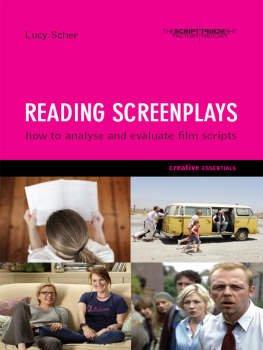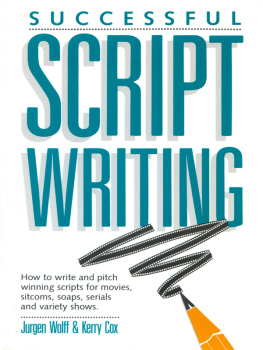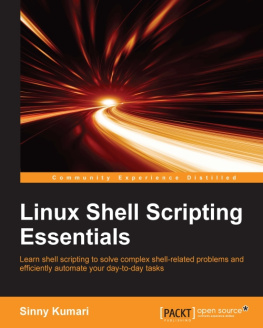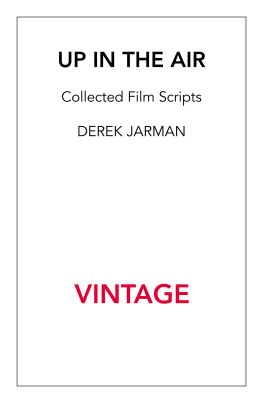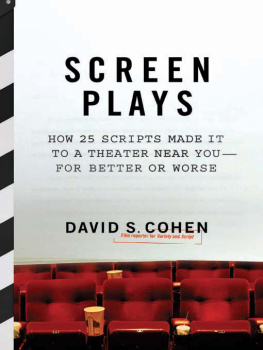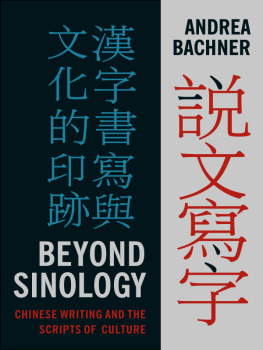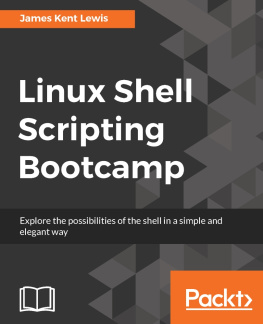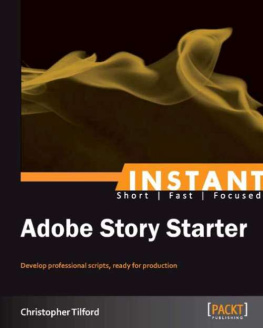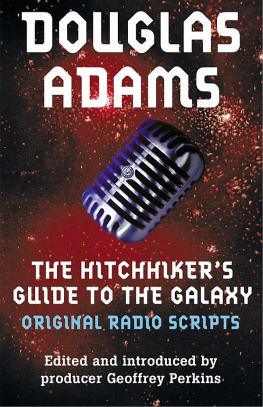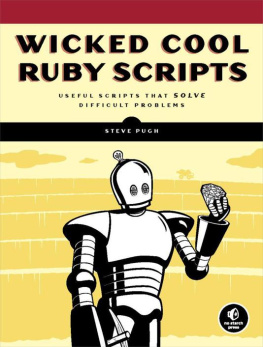Scher - Reading screenplays: how to analyse and evaluate film scripts
Here you can read online Scher - Reading screenplays: how to analyse and evaluate film scripts full text of the book (entire story) in english for free. Download pdf and epub, get meaning, cover and reviews about this ebook. City: Harpenden, year: 2011, publisher: Oldcastle Books;Kamera Books, genre: Home and family. Description of the work, (preface) as well as reviews are available. Best literature library LitArk.com created for fans of good reading and offers a wide selection of genres:
Romance novel
Science fiction
Adventure
Detective
Science
History
Home and family
Prose
Art
Politics
Computer
Non-fiction
Religion
Business
Children
Humor
Choose a favorite category and find really read worthwhile books. Enjoy immersion in the world of imagination, feel the emotions of the characters or learn something new for yourself, make an fascinating discovery.
- Book:Reading screenplays: how to analyse and evaluate film scripts
- Author:
- Publisher:Oldcastle Books;Kamera Books
- Genre:
- Year:2011
- City:Harpenden
- Rating:3 / 5
- Favourites:Add to favourites
- Your mark:
- 60
- 1
- 2
- 3
- 4
- 5
Reading screenplays: how to analyse and evaluate film scripts: summary, description and annotation
We offer to read an annotation, description, summary or preface (depends on what the author of the book "Reading screenplays: how to analyse and evaluate film scripts" wrote himself). If you haven't found the necessary information about the book — write in the comments, we will try to find it.
Scher: author's other books
Who wrote Reading screenplays: how to analyse and evaluate film scripts? Find out the surname, the name of the author of the book and a list of all author's works by series.
Reading screenplays: how to analyse and evaluate film scripts — read online for free the complete book (whole text) full work
Below is the text of the book, divided by pages. System saving the place of the last page read, allows you to conveniently read the book "Reading screenplays: how to analyse and evaluate film scripts" online for free, without having to search again every time where you left off. Put a bookmark, and you can go to the page where you finished reading at any time.
Font size:
Interval:
Bookmark:

Script Readers are crucial to the film industry, often responsible for determining whether a script is even looked at by a producer or development executive, yet those accountable for reading can be on the first rung of the industry ladder and have had little or no training for the task. This user-friendly how-to guide written by one of the UKs leading script analysis specialists, lays bare the process of analysing film scripts. This is invaluable to anyone looking to work as a script reader, anyone who wants to work in development with writers, and for screenwriters themselves who are seeking guidance on how the industry might respond to their work. An essential reference tool, the book includes information on:
- How to write a brilliant script report
- Storytelling and screen genres
- Treatments and other short documents
- Writing clear and detailed analysis of the craft of storytelling for film
- Best practice in reading and reporting on scripts
It also includes a full Resource Section listing useful print and online publications, organisations and associations.
Lucy Scher is a director of The Script Factory, the UKs premier screenwriters organisation. She devised the UKs first training course in script reading, developed the UKs only Diploma in Script Development, and is an internationally recognised script developer.
Lucy Scher
READING SCREENPLAYS
how to analyse and evaluate film scripts
creative ESSENTIALS
The Script Factory's Reader Training (and related) courses have been taught by Justine Hart, Marilyn Milgrom, Ludo Smolski, Rob Ritchie, Angeli Macfarlane, Kate Leys, Jonny Brown, Tracy O'Riordan, Sarah Harper-Barnes and Ranald Allan. Special thanks to Angeli Macfarlane, who I worked with on the Pathe Prize, selecting three projects out of some 2,000 submissions for a Script Factory reading. This greatly accelerated my learning and expertise in teaching script reading.
My thanks to
Alexandra Wilds for allowing me to report on her script Broken Heart Boot Camp; Peter Scher, my dad, who read the material and ensured it made sense; my mum, Anne Scher; my editor, Hannah Patterson, for asking me to do it, and Anne Hudson for her invaluable contributions along the way; my co-director of 11 happy years, Briony Hanson, now Director of Film for the British Council; and Sheena Bucktowonsing, our company manager these last two years. Together with Justine Hart, current co-director, Briony and Sheena shared their passion for film and encouraged this writing endeavour with much support and good humour. And my huge personal thanks go to Clare Muller for everything else.
Finally, my thanks to Charlotte Macleod for taking a punt on me in 1996 and letting me join her to launch The Script Factory.
Script readers are crucial to the film industry, often responsible for determining whether a script is even looked at by a producer or development executive. Yet those accountable for reading scripts are often on the first rung of the industry ladder and, even when they are already working in the film world, may have had little or no training for the task. This book is based upon knowledge acquired during the years of teaching the Script Factory Reader Training Course both in the UK and internationally. The course has used good produced scripts as well as a huge range of unproduced projects, very generously made available by aspiring screenwriters. Participants have ranged from heads of studios, heads of funds and screen agencies, producers, distributors, commissioners, directors, agents and screenwriters, as well as those seeking to start a career in reading and development. The intention of this book is to equip anyone who reads (or indeed writes) scripts and is required to make some judgement upon them, whatever their role and experience in the wider film industry, with the confidence and skills to write intelligent, informed script reports.
Scripts are usually first read at a very early stage of a films development. Every filmmaker will tell you that the story will continue to be rewritten dozens of times, both before and during production, and wont be completed until the final edit. The job of the reader, therefore, is not to judge a fledgling film script against acclaimed movies but rather to discern whether there is enough potential in the idea to make it worth the writers time and effort, or the producers cash, to invest in another draft that might eventually be shaped into a film.
For the past 13 years the Script Factory has been training readers to read screenplays a little more generously; not to suggest that something is good when it clearly isnt, but rather not to dismiss a good idea that may currently be let down by simplistic characterisation or a weak structure, things that could be fixed through wise development and honing of the writers craft. A skilful script reader should be able to see past such weaknesses and glimpse what the finished film could be if the writers intentions were to be successfully realised.
Alongside the chapters on the detail of the script report, including a sample report, this book incorporates an analysis of genre and how to use it in reading and development; a chapter on both writing and assessing treatments; and a final section on the job of development, both what it is and how to manage the transition from reading scripts to working with screenwriters.
Understanding how a script is assessed and developed is possibly the most valuable training that a screenwriter can access and, if you read this as a writer, the step-by-step process of analysing the material offers you the best way to obtain distance from, and objectivity about, your project to help in making the decisions that will improve it.
I joined the newly conceived Script Factory to produce the first season of screenplay readings in the autumn of 1996. Our aim was to showcase the scripts of the UKs finest screenwriters and bring them to life with exceptional actors, in front of a film-industry audience, to celebrate the craft of writing for the screen.
My work involved reading each of the scripts, at least twice, and then listening to them being delivered by actors at a tempo that enabled me to visualise the action. In this way, and entirely unexpectedly, I learned the craft of screenplay. It was an enormously privileged, and perhaps unique, start to a development career.
I only became aware that I had acquired this skill when the Script Factory project opened its doors and I began to read scripts by hopeful and enthusiastic new writers who clearly didnt know or understand the craft of screenwriting. In an effort to convey some of the knowledge that I had absorbed I wrote script reports, first on an adhoc basis to anyone who asked, and then launched the Script Report Service that still runs today. This offers any screenwriter a constructive, analytical report on their project to help them decide the development priorities for the next draft.
The success of the Script Report Service created the need for more readers than just myself. The ones available at that time wrote coverage for executives, and had a style that was personal, but often very critical and inappropriate to offer the writer. As I had paid work to offer to successful participants, in the summer of 1999 I felt confident enough to launch a Report Writing Course. I devised some exercises and processed the learning I had absorbed about story and screenwriting craft into six lecture sessions.
Over the years the report-writing course and its content has been developed and refined, improved and expanded and I am indebted to all the trainers for their invaluable contributions. And, of course, we have gained immeasurably from the many thousands of participants who have taken part and warmly and generously offered their insights, thoughts and experiences. However, my debt is greatest to my Script Factory co-director Justine Hart who brought extraordinary intellectual rigour to the material; much of the thinking and precision about how to convey it in this book are hers.
Font size:
Interval:
Bookmark:
Similar books «Reading screenplays: how to analyse and evaluate film scripts»
Look at similar books to Reading screenplays: how to analyse and evaluate film scripts. We have selected literature similar in name and meaning in the hope of providing readers with more options to find new, interesting, not yet read works.
Discussion, reviews of the book Reading screenplays: how to analyse and evaluate film scripts and just readers' own opinions. Leave your comments, write what you think about the work, its meaning or the main characters. Specify what exactly you liked and what you didn't like, and why you think so.

